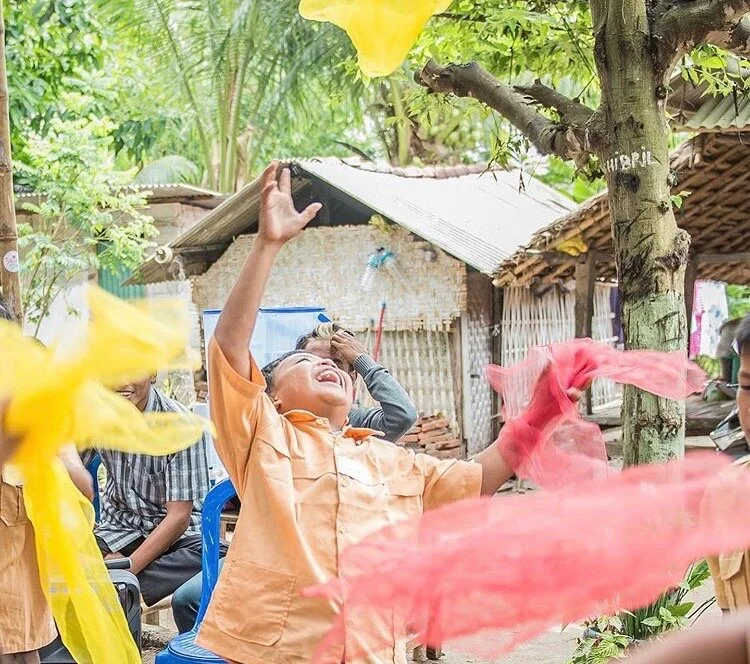Holistic Circus Therapy (HCT), LLC
HCT is a registered, accredited private practice that combines occupational therapy with circus arts to address the unique health needs of individuals and communities. They provide professional development training, fieldwork placements and direct client services that utilize circus as an evidence-based educational and therapeutic tool. 100% of profits from HCT's services fund CircusAid projects, which provide free services to help people displaced by war and natural disasters attain transferable life skills to promote greater success in unstable physical and political environments.
What is Occupational Therapy?
Occupational Therapy (OT) is concerned with the connection between the activities people pursue self-care, productivity, leisure, and their overall health and well-being.
Health is viewed in occupational therapy as more than the absence of disease and is strongly influenced by what people do in everyday life.
Occupational therapists work with people who have various differences and abilities in physical, cognitive, and emotional functioning. OTs also share the belief that engagement in activities, which provide a mix of challenging and achievable tasks, promotes health and well-being among individuals and communities.
In other words, OT has everything to do with exploring how external situations and personal capabilities and limitations impact one’s ability to live their life with purpose.
Jill Maglio won the 2022 NBCOT Innovation Award for Holistic Circus Therapy
FIND MORE HERE: OTR Combines OT with Circus Arts to Reach Communities Throughout the World
What is Circus?
Circus exists throughout various cultures and value people for their uniqueness. This makes it a suitable model for community health.
Circus requires the presence of mind, focus, fine and gross motor skills, body awareness, self-confidence, and teamwork, and often results in joy, laughter, and a sense of accomplishment.
Overall, the circus, as a discipline, provides a variety of experiences and activities that facilitate positive emotional, physical, and mental health outcomes.
Interested in supporting? Donate below.
Combining OT + CIRCUS
The benefit of combining circus and occupational therapy lies in the ability to enable increased function in the following areas with activities focusing on coordination, body awareness, teamwork, problem-solving, perseverance, fitness, strength, and life skills acquisition:
Emotional Health:
Circus activities promote turn-taking, leadership, communication, empathy, expression, trust, and dependability. Grading tasks individually to have challenging and achievable components promotes motivation and satisfaction, increased self-confidence and self-efficacy, and provides respite from stress or mental instability.
Physical Health:
Circus skills can be graded to fit the capacities of people with a wide variety of physical and mental capabilities. Many activities used in circus increase body awareness, circulation, strength, tone, and flexibility.
Cognitive Function:
Circus works the brain to increase gross and fine motor control, coordination, visual perceptual abilities, sequencing, sense of rhythm and timing, reactions, bimanual hand use, and concentration.
Social Health:
Circus skills are essential for healthy peer interaction and teamwork. This unique program focuses on highlighting an individual's strengths and providing life skills to improve their ability to function socially and become a positive active member of their society.
Core Problems Addressed
The need for government, health, and non-governmental organizations to address
occupational deprivation, trauma, life skills acquisition, and community health of
marginalized populations, refugees, and people displaced by socio-political conflict.A lack of diverse training for occupational therapy students, clinicians, and other professionals in innovative occupational therapy-informed theoretical and practical skills to enable greater capacity building for individuals and communities.
How We Address Trauma
Through physical activity, trauma is stored in cellular memory; primarily in the muscle and fascia can be released.
A mixture of cognitive and physical activities is delivered in a way to promote
mindfulness, ‘flow’ states, and presence; resulting in more inner peace and improved self-awareness, emotional regulation, and planning abilities; that may have been impacted by detrimental effects of trauma on the prefrontal cortex.Through the experience of play, traumatic memories are replaced with more joyous ones centered around resilience, community health, and intrinsic motivation to create a sustainable impact.
Sustainability
We perceive sustainability as the continuation of the life skills and community health benefits we try to support through the facilitation of circus activities, not necessarily the circus activities themselves.
Prioritizing the continuation of circus activities we consider to be brand or organization focused. Assessing sustainability based on the continuation of the social and emotional health benefits our activities promote is what we consider to be more impact-focused. We strive to be impact-focused, prioritizing optimal long-term experiences and benefits for the communities we serve.
Learn more about our Sustainable Model Here.
HOW OUR PROGRAM PROMOTES CHANGE
Change in Practice
Training occupational therapists, social workers, mental health workers, teachers, global health workers, educational professionals, and circus artists in Holistic Circus Therapy.
Creating a multidisciplinary team approach to healthcare and education through fieldwork placements and learning environments.
Providing free services to refugees increase resilience, mental health, and life skills, enabling them to make positive contributions.
By introducing new ways of implementing occupational therapy within socio-political contexts that focus on community health and the sustainability of the practice.
By introducing new ways occupational therapists can work in partnership with circus arts, marginalized and displaced persons.
By introducing evidence-based practices of integrated social circus and occupational therapy philosophies to promote global health in areas where social, environmental, and political unrest are present.




